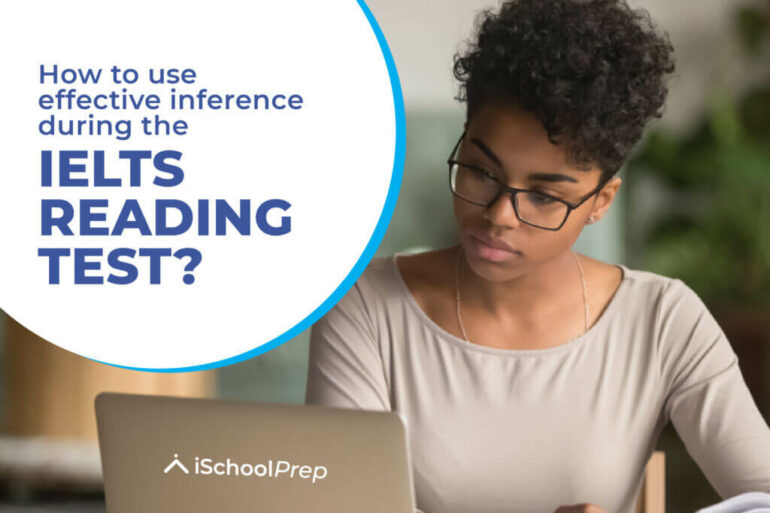Table of Contents
- Understand the context
- Identify key information and supporting evidence
- Analyze relationships between different ideas
- Use logic to draw conclusions
- Practice making inferences
- Learn to recognize common inference types
- Look for context clues
- Use visualization techniques
- Pay attention to details
- More additional strategies to improve reading comprehension skills
- Key takeaways
- FAQs
The IELTS Reading section is an integral part of the International English Language Testing System examination (IELTS). It evaluates your ability to understand and interpret written texts in English. The section consists of three reading passages from various genres: newspapers, magazines, books, and academic journals. The passages progressively increase in difficulty, challenging your comprehension skills and ability to extract information accurately.
Inference demands sharp critical thinking skills to decode hidden meanings and contextual clues within the text. Making accurate inferences is crucial to scoring well on this part of the IELTS exam. In our blog, we will provide tips and tricks to hone your inference skills during the IELTS reading test.
Understand the context
Understanding the context of the text is crucial for making accurate inferences. Start by reading the title and introductory paragraph to get an idea of the text. Pay attention to the tone and writing style, as these can provide clues about the author’s purpose and perspective. As you read the text, connect the ideas presented and look for patterns and themes to help conclude.
Identify key information and supporting evidence
Seek out facts, statistics, and examples that bolster the author’s argument or perspective. Inferences rely on supporting evidence, making identifying critical information within the text crucial. Be mindful of the language employed and watch for cues like signal words or phrases that indicate cause-effect relationships or comparisons.
Analyze relationships between different ideas
Inferences require the ability to connect ideas and draw conclusions based on the data presented in the text. You can make more accurate inferences by analyzing the relationships between different ideas. Take note of connections such as cause-effect relationships, comparisons, and contrasts. Pay careful attention to how the author presents information and organizes their ideas.

Use logic to draw conclusions
Inferences necessitate applying logical thinking skills, emphasizing the importance of employing logic when concluding. Begin by identifying the evidence presented within the text and carefully assess how it aligns with the author’s argument or perspective. Pose questions to yourself, such as:
- What is the author trying to say?
- How does the provided evidence support their argument?
- What conclusions can be reasonably drawn based on the presented evidence?
By critically evaluating these aspects, you can enhance your ability to make sound and well-supported inferences while engaging with the text.
Practice making inferences
Enhancing your inference skills requires regular practice. Begin engaging with texts from various topics and genres, actively making inferences as you read. Focus on the evidence provided within the text and try to establish connections between the presented ideas. Seek patterns and recurring themes, and reflect on the author’s perspective and purpose. Doing so can develop your ability to draw insightful conclusions quickly. Remember, consistent practice is key to refining your inference skills.

Learn to recognize common inference types
There are different types of inferences that you may encounter during the IELTS reading test. Learning to recognize common inference types can help you make more accurate inferences. Some common types are as follows-
- Drawing conclusions based on cause-effect relationships.
- Making predictions based on the evidence presented in the text.
- Inferring the author’s opinion or perspective to deduce their stance or viewpoint.
- Drawing conclusions based on comparisons or contrasts to reach meaningful conclusions.
Look for context clues
Context clues are crucial in making inferences and providing valuable information to aid comprehension. When reading the text, be attentive to cues like signal words or phrases that show a change in direction or focus. These cues can include transitional words or phrases such as “however,” “on the other hand,” or “in contrast.” Additionally, pay close attention to the language used by the author, as certain words or phrases may offer clues about their perspective or purpose.
Use visualization techniques
Visualization techniques can be valuable tools for making inferences, enabling you to create vivid mental images of the text. As you read, actively engage your imagination to visualize the various ideas presented and their interconnections. By mentally picturing the information, you can better comprehend the relationships between different concepts. Use this mental imagery to make predictions based on the evidence provided in the text.
Pay attention to details
Making accurate inferences requires paying attention to details. Look for specific details presented in the text, such as dates, names, or numbers. These details can provide vital information for making inferences and connecting different ideas during the IELTS reading test.
More additional strategies to improve reading comprehension skills
- Skimming and scanning: Quickly scanning the text to get a general overview of the content and skimming through paragraphs to locate specific information.
- Identifying the main idea and supporting details: Determining the text’s central theme or main point, as well as recognizing the supporting information that strengthens or expands upon that main idea.
- Summarizing the text: Condensing the key points and main ideas of the text in your own words, demonstrating your understanding of the content.
- Making connections: Recognizing and establishing connections between different ideas and concepts presented in the text, enabling you to grasp the bigger picture and infer relationships.
- Identifying the author’s purpose and perspective: Analyzing the language, tone, and arguments presented in the text to discern the author’s intent and viewpoint helps you better understand the message being conveyed.
Key takeaways
- Mastering the skill of effective inference during the IELTS reading test is the key to scoring well on the examination.
- Understanding context and key information, analyzing relationships between different ideas, and drawing logical conclusions are a few ways to improve inference.
- Strategies such as looking for context clues, using visualization techniques, and paying attention to detail are proven effective in improving reading comprehension.
- Regularly practicing by engaging with texts from various topics and genres is the key to honing your inference skills during the IELTS reading test.
Improving your inference skills is essential for performing well in the IELTS reading test. We hope this blog helped you gain a better understanding of the topic. If you require further assistance with your IELTS test preparation, then feel free to contact us.
Liked this blog? Read more: IELTS exam questions | Writing and Speaking sections!
FAQs
Q1: How can skimming and scanning techniques enhance reading comprehension for the IELTS reading test?
Answer: Skimming and scanning techniques allow you to quickly gather an overview of the text and locate specific information efficiently. Skimming helps you grasp the main ideas and overall structure of the passage, while scanning enables you to find particular details or keywords. These techniques save time and improve comprehension by providing a foundation for deeper reading and analysis.
Q2: Can improving my inference skills enhance my overall English language proficiency?
Answer: Yes, enhancing your inference skills can positively impact your overall English language proficiency. Inference-making requires a deep understanding of context, vocabulary usage, and logical reasoning, all essential components of language comprehension. By practicing and refining your inference skills, you’ll become a more proficient reader, thinker, and communicator in English.
Q3: Are there any specific strategies to help me make inferences within time constraints during the IELTS reading test?
Answer: Time management is crucial during the IELTS reading test. To make efficient inferences within the given time frame, focus on honing your skimming and scanning techniques. Quickly scan the passage for relevant information and mark essential details. Prioritize the sections that contain the most critical information for answering questions. With practice, you’ll become more adept at swiftly identifying key information and making accurate inferences within the time constraints.






